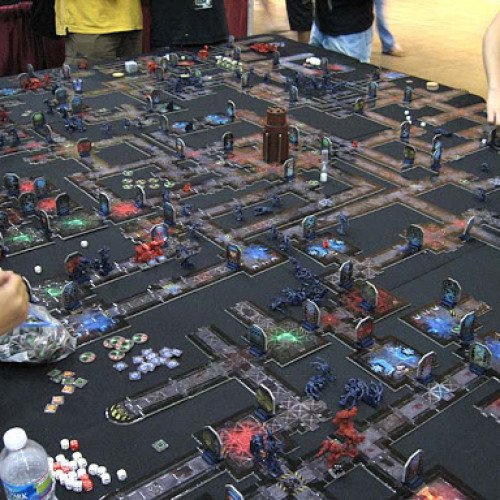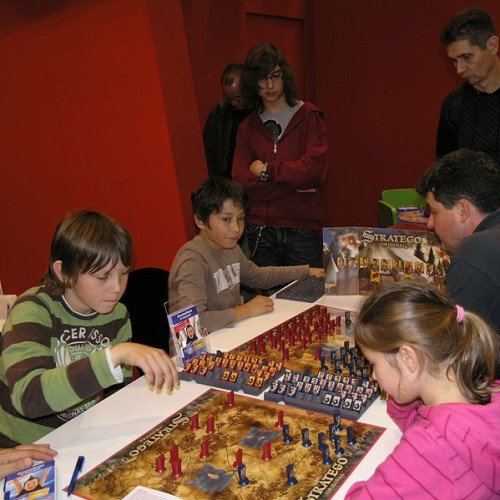SPACE HULK VS STRATEGO

SPACE HULK
Space Hulk is a board game for two players by Games Workshop. It was released in 1989. The game is set in the fictional universe of Warhammer 40,000. In the game, a "space hulk" is a mass of ancient, derelict space ships, asteroids, and other assorted space debris. One player takes the role of Space Marine Terminators, superhuman elite soldiers who have been sent to investigate such a space hulk. The other player takes the role of Tyranid Genestealers, an aggressive alien species which have made their home aboard such masses. In Warhammer 40,000, the term "space hulk" is used to refer to any massive derelict space ship. Due to the shifting, immaterial nature of the Warp, an otherworldly realm through which space ships may travel between the stars far quicker than they would be able to through real space, some space hulks are jumbled and twisted agglomerations of multiple vessels lost to the Warp throughout centuries or millennia. Space hulks may house more than just Genestealers; other threats aboard can include human followers of the dark gods of Chaos, nightmarish Warp Daemons, and Orks who use space hulks as their "standard" method of interstellar travel. Genestealers were described in an entry of the "Aliens and monsters" section of the first edition of Warhammer 40,000 (the "WH40K - Rogue Trader" manual), but they were very different from their Space Hulk incarnation, which was more influenced by the xenomorphs depicted in the Alien franchise. Since the 1990s, subsequent games like Warhammer 40,000 and Epic have absorbed them as part of the overall Tyranid army where they serve as the shock troops, although their origins are not related to any other Tyranid broods. A force composed purely of Genestealers can still be fielded as a sub-type of the Tyranid army, in what is known as a Genestealer Cult. The Cult is described in the in-game background as an infiltration force that weakens a target planet, infecting the local population and causing civil unrest in advance of the arrival of the main Tyranid hive fleet.
Statistics for this Xoptio

STRATEGO
Stratego is a strategy board game for two players on a board of 10×10 squares. Each player controls 40 pieces representing individual officer and soldier ranks in an army. The pieces have Napoleonic insignia. The objective of the game is to find and capture the opponent's Flag, or to capture so many enemy pieces that the opponent cannot make any further moves. Stratego has simple enough rules for young children to play but a depth of strategy that is also appealing to adults. The game is a slightly modified copy of an early 20th century French game named L'Attaque. It has been in production in Europe since World War II and the United States since 1961. There are now two- and four-handed versions, versions with 10, 30 or 40 pieces per player, and boards with smaller sizes (number of spaces). There are also variant pieces and different rulesets. The International Stratego Federation, the game's governing body, sponsors an annual Stratego World Championship. The name Stratego was first registered in 1942 in the Netherlands. The United States trademark was filed in 1958 and registered in 1960 to Jacques Johan Mogendorff and is presently owned by Jumbo Games as successors to Hausemann and Hotte, headquartered in the Netherlands. It has been licensed to manufacturers such as Milton Bradley, Hasbro and others, as well as retailers such as Barnes & Noble, Target stores, etc. The game box contents are a set of 40 gold-embossed red playing pieces, a set of 40 silver-embossed blue playing pieces, a glossy folding 15 1⁄2 in × 18 1⁄2 in (39 cm × 47 cm) rectangular cardboard playing board imprinted with a 10×10 grid of spaces, and instructions printed in English on the underside of the box top. The early sets featured painted wood pieces, later sets colored plastic. The pieces are small and roughly rectangular, 1 in (25 mm) tall and 3⁄4 in (19 mm) wide, and unweighted. More modern versions first introduced in Europe have cylindrical castle-shaped pieces. Some versions have a cardboard privacy screen to assist setup. A few versions have wooden boxes or boards.